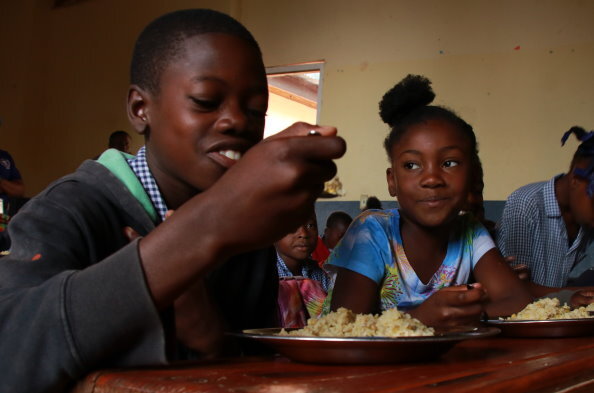World Food Programme ramping up to reach 700,000 with emergency operations in Haiti

One in three Haitians, or 3.7 million people, need urgent food assistance, including 1 million suffering severe hunger according to a nationwide study conducted in August by the CNSA (National Coordination for Food Security) with support from WFP and the Food and Agriculture Organization of the United Nations.
“Poor Haitian families face a very dramatic situation. WFP and its partners are doing their utmost to reach a growing number of vulnerable people with emergency assistance,” said Miguel Barreto, WFP Regional Director for Latin America and the Caribbean, who is on a field mission to Haiti until the 7th of December.
Millions of Haitians have been hit hard by rising prices, a weakening local currency, and a drop in agricultural production. Social and civil unrest over the past three months rendered many main roads impassable too, further restricting access to food for poorer households. Recently, a slight improvement in security allowed WFP to deliver food assistance to families cut off since September.
Over the past three weeks, nearly 23,000 people have received emergency food assistance in the Nord-Ouest department, defined by the government’s report as the most food insecure in the country. WFP provides families with enough food for a month.
WFP is also expanding distributions and providing cash and vouchers to other departments affected by food insecurity. In November, 67,000 people were given cash so as local markets recover, households can purchase food locally. So far in 2019, WFP has met the emergency food needs of 138,000 people across the country. New distributions and deliveries will be organized whenever the security situation allows.
The unrest has hampered humanitarian organizations’ efforts too. Transport of WFP food to many vulnerable communities, particularly using the main roads between the capital Port-au-Prince and Artibonite and across southern Haiti, has been affected.
“Despite these challenges, we are committed to ensure the continuity of our assistance. It’s heart-warming to see schools reopening and children able to attend class, as we also provide them with a hot meal. For poor families, it is often the only meal they eat in a day,” said Barreto.
WFP’s school feeding programme provides meals to 300,000 children annually in 1,200 schools nationwide. It is considered the largest food safety net in Haiti but only 60 percent of schools have reopened since the turmoil began three months ago.
To reach areas difficult or impossible to access by road, WFP launched a three-month air operation in late November. A chartered Mi8-AMT helicopter is providing reliable transport for cargo and staff from the entire humanitarian community. It can carry up to 22 passengers or 4 tons of cargo.
For WFP, investing in sustainable solutions is key to addressing the root causes of food insecurity in Haiti. WFP significantly increased its support to local agriculture in line with Government plans to revitalize the agriculture sector as a means of tackling food insecurity.
Broadcast Quality Video available here
Photos available here
Feature-length story here
# # #
The United Nations World Food Programme - saving lives in emergencies and changing lives for millions through sustainable development. WFP works in more than 80 countries around the world, feeding people caught in conflict and disasters, and laying the foundations for a better future.
Follow us on Twitter @wfp_media
Topics
Haiti Emergencies Food security School mealsContact
For more information please contact (email address: firstname.lastname@wfp.org):
Antoine Vallas, WFP/Port-au-Prince
+509 3791 8049
Gary Karr, WFP/Washington +1 202 653 1154
Julie Marshall, WFP/Toronto +1 905 818 2664
Norha Restrepo, WFP/Panama
+507 317 3900/ +507 6671 5355
Bettina Luescher, WFP/Geneva/Berlin
+49 30 206149-29/ +49 160 9926 1730
Aneta Szczyglowska, WFP/Brussels
32 2500 0913/ +32 491 395 420
Azfar Deen, WFP/Rome
+39 06 6513 2700/+39 349 286 5851
